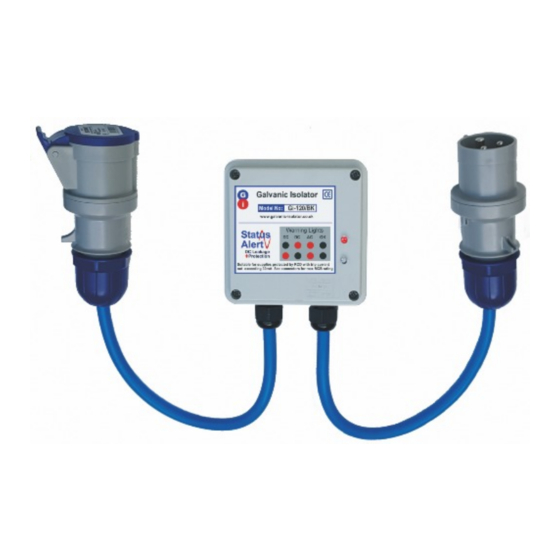Galvanic Isolator Gi-120/A Gebruiksaanwijzing - Pagina 5
Blader online of download pdf Gebruiksaanwijzing voor {categorie_naam} Galvanic Isolator Gi-120/A. Galvanic Isolator Gi-120/A 7 pagina's.

Model Gi-120/BK only
Occasionally, when you fit a Status Monitored galvanic isolator, both of the
warning lights may glow straight away.
If both lights are illuminated on your galvanic isolator, you have AC earth
leakage. You do NOT have a faulty isolator. In fact, your isolator is alerting
you to a potentially dangerous situation that you may not previously have
been aware of.
There are two main types of earth leakage: Mains Leakage and Imprinted Leakage.
Mains Leakage
Mains Leakage happens when an appliance, cable or connection has poor
insulation resistance, and some of the circuit's current "leaks" away to earth. If there
is sufficient leakage, the earth leakage circuit breaker, also known as the RCD, will
trip, disconnecting the supply.
At lower levels of leakage, although the RCD may not trip, the lights on your
galvanic isolator may still glow, alerting you to the likelihood of earth leakage.
Usually, an earth leakage fault will only get worse, so you should always take this
seriously and investigate.
!
No two electrical systems are the same, so it's only possible to give the broadest
suggestions of how to locate any problem. Usually some detective work is required,
and this starts by switching off the main RCD on the boat. In most cases, this will
result in the lights on the isolator going out. If not, there is probably something
connected to the mains supply BEFORE the RCD.
A
ssuming the lights go out when the RCD is switched off, switch off ALL the
circuit bbreakers, then switch the RCD back on. In most cases, the isolator's
lights will stay off. You can then switch the circuit breakers back on one at a time
until the isolators lights come back on. The last circuit breaker you switched on has
the faulty circuit, or appliance connected to it.
Very rarely, even though all the circuit breakers (except the RCD) are switched off,
the isolator lights will remain on. In this case you will need to disconnect all
appliances, either by pulling out the plugs, or disconnecting any wired in appliances.
Do this one at a time, taking care to ensure that you don't forget anything. As you
disconnect items, check the isolator lights. The last item you disconnect is the one
causing problems.
Ensure that the electrical supply is disconnected
before working on a circuit, and remember that in
some systems, an auxiliary supply such as an inverter
may automatically kick in when the mains supply is
disconnected. If you are in any doubt, you should
entrust the work to a competent person.
